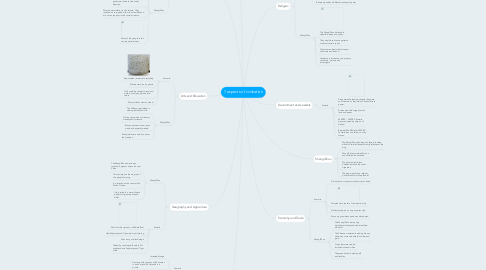
1. Science and Technology
1.1. Sumeria
1.1.1. Invented plough
1.1.2. Came up with concept of 60 minutes in an hour, and 60 seconds in a minute
1.1.3. Invented the wheels
1.1.4. Invented boats and oars
1.2. Shang/Zhou
1.2.1. Iron was made which was stronger than bronze and was able to be used in weapons.
1.2.2. The Chinese were very good at working with metallurgy. Bronze was made almost autonomously.
1.2.3. Roads were made to ensure faster and more efficient transportation.
1.2.4. The Chinese were also the first to use the catapult.
2. Geography and Agriculture
2.1. Shang/Zhou
2.1.1. The Shang/Zhou empire was located in present day north east China.
2.1.2. This society has the majority of the people farming.
2.1.3. It is located on the coast of the Pacific Ocean.
2.1.4. It is located in a warm climate perfect for growing rice and millet.
2.2. Sumeria
2.2.1. Was in fertile crescent, in Middle East
2.2.2. Had Euphrates and Tigris river from farming
2.2.3. Was a dry, arid landscape
2.2.4. Traded by sending sailboats full of supplies down Euphrates and Tigris rivers
3. Arts and Education
3.1. Sumeria
3.1.1. Kept written records of everything
3.1.2. Schools were run by priests
3.1.3. Girls could be taught to read and write, but only by parents and tutors
3.1.4. Most children went to school
3.2. Shang/Zhou
3.2.1. The Chinese specialized in making textiles and silk.
3.2.2. Tombs were made for the very wealthy and fortunate.
3.2.3. Bronze pots and vases were made and expertly crafted.
3.2.4. Many idols were made to honor their religion.
4. Social Structure and Family Life
4.1. Sumeria
4.1.1. Four social classes: Nobles, Commoners, Clients, and Slaves
4.1.2. Nobles were the ruling class
4.1.3. Most people were commoners
4.1.4. Man was head of household, could have multiple wives
4.2. Shang/Zhou
4.2.1. The Shang/Zhou society relied on the Confucianism as the social class.
4.2.2. Confucianism is where the emporers reigns first while the merchants are second followed by; scholars, farmers and slaves.
4.2.3. They were able to maintain a stable government due to this social hiearchy.
4.2.4. Women were inferior in this culture. They received no recognition from their families and are not as superior in this social structure.
4.2.5. Most of the people in this society were farmers.
5. Conor Riddle, Cj Vaughn
6. Shang/Zhou
6.1. The Shang/Zhou had kings as they're leaders with also smaller leaders mostly relatives of the king.
6.2. Shang/Zhou murdered his son and tortured his ministers.
6.3. The government is less bureaucratic than the other dynasties.
6.4. The king was often a religous, political and/or military leader.
7. Religion
7.1. Sumeria
7.1.1. Sumerians were the first to develop polytheistic beliefs
7.1.2. Priests were responsilbe for continuing culture
7.1.3. Believed that humans were created to be servants to the gods
7.1.4. Believed gods had different ranks and power
7.2. Shang/Zhou
7.2.1. The Shang/Zhou believed in celestial beings and spirits.
7.2.2. They would use bronze patterns to vessel certain spirits.
7.2.3. Oracles are objects that foresaw the future and an end.
7.2.4. Leaders are broken up into prayers, sacrificers, diviners and astrologers.
8. Government and Leaders
8.1. Sumeria
8.1.1. Kings were the leaders, though they were not dictators as they did not have ultimate power.
8.1.2. Priests also held large plots of land and power
8.1.3. 2400 BC - 2200 BC Sumeria was conquered by sargon of Akkad.
8.1.4. Between 3360 BC and 2200 BC, Sumeria was a collection of city states.
9. Economy and Trade
9.1. Sumeria
9.1.1. Did not have many natural resources to trade
9.1.2. Temples were center of commerce in city
9.1.3. Craftsmanship was a very important job
9.1.4. Economy grew when trade was developed
9.2. Shang/Zhou
9.2.1. The Shang/Zhou were a very agricultural society and trade revolved around it.
9.2.2. The Chinese mastered in making bronze which was more valuable than silver and gold.
9.2.3. Crops that were traded included rice and millet.
9.2.4. They specialized in making silk and textiles.
